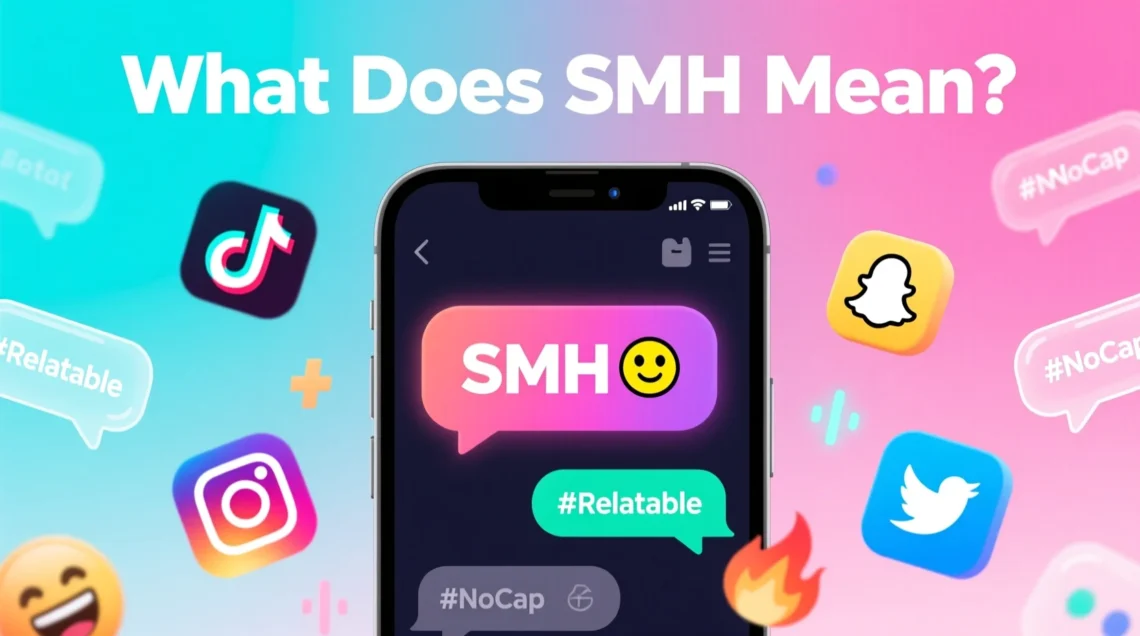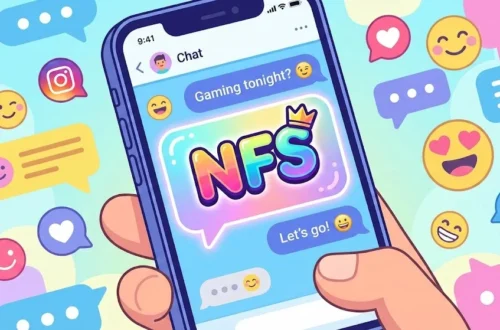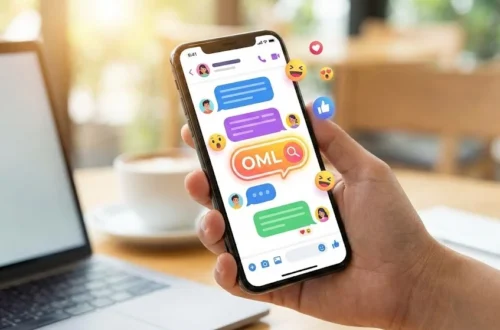Why Everyone’s Asking “What Does SMH Mean?”
If you’ve spent any time online—scrolling through TikTok comments, laughing at memes, or texting friends—you’ve probably come across the abbreviation SMH. Maybe someone replied to a story with “SMH 🤦” or commented “people still think that? smh.”
But what does SMH mean exactly? Why does everyone use it? And when should you use it (or not use it)?
In this guide, we’ll break down what SMH means, how it’s used across different platforms, when it’s appropriate, and why it became one of the most recognized slang terms in the digital world.
By the end, you’ll not only understand what it stands for but also how to use it naturally in everyday conversations online.
SMH Meaning: The Quick Definition
Let’s start simple.
SMH stands for “Shaking My Head.”
It’s an expression people use when they’re frustrated, disappointed, or can’t believe what they’re seeing or hearing. It’s a quick way to show disbelief or mild disapproval—without typing a full sentence.
Example:
“You really believed that was real news? SMH.”
So, when someone says SMH, they’re figuratively shaking their head in disbelief. It’s the digital version of an exasperated sigh or an eye roll.
SMH: The Full Form and Origin
The phrase “shaking my head” has existed for decades in real life. But it wasn’t until the early 2000s that SMH appeared as an internet abbreviation.
It first gained traction on forums and messaging platforms like BlackPlanet and MySpace, where users shortened common expressions to save time while typing.
According to the Urban Dictionary, the earliest recorded entry for SMH dates back to 2004, defining it simply as “shaking my head.”
As smartphones, texting, and social media exploded, SMH became a staple of digital communication—especially on Twitter, Facebook, and later TikTok and Instagram.
Today, it’s recognized across generations, but it’s particularly popular among Gen Z and Millennials, who use it to convey tone in short-form digital messages.
SMH in Texting and Online Conversations
In texting, SMH serves as a quick reaction to something confusing, embarrassing, or disappointing. It helps you express emotion without typing a long response.
Here’s how people typically use it:
- Reacting to bad decisions: “He spent all his savings on crypto again… SMH.”
- Responding to drama: “They’re fighting over who liked whose photo, smh.”
- Expressing disbelief: “You forgot your password again? SMH 😂.”
Tone and Context
The tone of SMH depends on how it’s used:
- Lighthearted or teasing: “Forgot your charger again, smh 😂.”
- Serious or frustrated: “He lied about it again. SMH.”
Adding emojis often helps clarify tone.
- Playful: “SMH 😂🤦”
- Disappointed: “SMH 😔”
- Annoyed: “SMH 🙄”
What Does SMH Mean on Different Platforms?
SMH is used everywhere—from text messages to tweets—but its tone and context vary across platforms.
Let’s break it down.
SMH on Snapchat
On Snapchat, SMH usually appears as a reaction to stories, Snaps, or messages that show something surprising or embarrassing.
- Example: You post a photo of dropping your coffee, and your friend replies, “SMH 😩.”
- Often combined with emojis or slang like “bruh” or “lol.”
It’s not meant to be rude; it’s a quick, friendly way to say, “I can’t believe you did that!”
SMH on TikTok
On TikTok, SMH appears in comment sections and video captions when users react to funny, outrageous, or ironic content.
- Example caption: “He said pineapple belongs on pizza… SMH.”
- Often used with hashtags like #smh or #fail.
SMH on TikTok adds personality and humor—it’s part of meme culture now.
SMH on Instagram
People use SMH in comments, captions, and DMs on Instagram when something feels unbelievable or frustrating.
Examples:
- “Still waiting for summer… SMH.”
- “These prices keep going up, smh.”
It helps make posts feel casual and relatable.
SMH on Twitter/X and Facebook
SMH first gained popularity on Twitter because users needed to express reactions within character limits.
- Example tweet: “Politicians arguing again instead of fixing things. SMH.”
- On Facebook, it often appears in comment threads discussing news or opinions.
It’s a subtle way to express disappointment without starting an argument.
SMH in Slang Culture: What It Really Expresses
At its core, SMH isn’t about anger—it’s about disbelief or disappointment. It’s a digital body language cue that shows emotion without needing facial expressions.
When someone types SMH, they’re not always judging. Sometimes, it’s gentle teasing or frustration over something trivial.
Common Emotions Behind SMH
- Disbelief
- Disappointment
- Frustration
- Amusement (sometimes ironic)
You might think of SMH as a virtual facepalm.
Related Reactions
| Expression | Meaning | Tone |
|---|---|---|
| Facepalm 🤦 | A literal gesture of disbelief | Mild frustration |
| Bruh | Slang for disbelief or surprise | Playful |
| Can’t even | Overwhelmed disbelief | Sarcastic or dramatic |
| Seriously? | Verbal disbelief | Neutral to annoyed |
Each of these carries similar emotion—but SMH is universal, short, and instantly understood.
Common SMH Examples (With Realistic Usage)
Here’s how SMH appears naturally in real-world messages:
| Scenario | Example Message | Meaning |
|---|---|---|
| Friend does something silly | “You wore two different shoes to work? SMH 😂” | Light teasing |
| Disappointing news | “They canceled the concert… SMH.” | Frustration |
| Internet drama | “People fighting over nothing again. SMH.” | Disbelief |
| Bad decision | “She quit her job without a plan. SMH.” | Disapproval |
| Funny fail | “He tripped over his own feet 😂 smh.” | Playful sarcasm |
SMH vs. Other Internet Acronyms
SMH isn’t the only shorthand people use to react emotionally. It’s part of a much bigger system of texting acronyms that shape digital communication.
Here’s how it compares to others:
| Acronym | Meaning | Used To Express |
|---|---|---|
| SMH | Shaking My Head | Disbelief, frustration |
| LOL | Laugh Out Loud | Humor, amusement |
| OMG | Oh My God | Shock, surprise |
| FML | F*** My Life | Exasperation |
| TBH | To Be Honest | Honesty, truthfulness |
| IDC | I Don’t Care | Indifference |
| FR | For Real | Agreement, emphasis |
| IKR | I Know, Right? | Shared disbelief |
While each serves a different purpose, SMH is special because it conveys tone and emotion in a subtle way. It’s not about laughing—it’s about reacting.
Is SMH Ever Rude or Sarcastic?
That depends entirely on how it’s used.
SMH can sound sarcastic, passive-aggressive, or even dismissive if the tone isn’t clear.
Examples:
- Friendly: “You forgot your wallet again, smh 😂.”
- Harsh: “You never think before you act. SMH.”
To avoid misunderstandings, pair it with emojis or use it in casual contexts only.
When SMH Might Feel Rude
- When used to shut someone down in an argument.
- When it replaces constructive feedback.
- When the message tone already feels negative.
Think of SMH as emotional shorthand—powerful, but context matters.
How to Use SMH Correctly (With Do’s and Don’ts)
Knowing when and how to use SMH helps you sound natural online.
✅ Do’s
- Use it casually in texts or comments.
- Pair it with humor or emojis for tone.
- Use it to express light frustration or disbelief.
- Add it at the end of sentences for emphasis.
❌ Don’ts
- Don’t use SMH in professional or formal settings.
- Don’t use it aggressively or sarcastically.
- Don’t overuse it—it loses meaning.
Tip:
SMH is more expressive than words like “wow” or “really,” but only when used sparingly.
Related Slang Terms You Should Know
Internet slang changes fast, but understanding common abbreviations helps you stay current.
| Term | Meaning | Context of Use |
|---|---|---|
| FR | For Real | Emphasizing truth |
| IKR | I Know, Right? | Agreement |
| NGL | Not Gonna Lie | Honest admission |
| IMO/IMHO | In My (Humble) Opinion | Sharing thoughts |
| BRB | Be Right Back | Temporary absence |
| TL;DR | Too Long; Didn’t Read | Summary |
| TBH | To Be Honest | Emphasizing honesty |
| AFK | Away From Keyboard | Gaming/chat status |
These terms often appear alongside SMH in messages, especially when chatting informally.
Why People Use SMH in Digital Conversations
SMH serves an important function in online language—it conveys emotion efficiently.
Here’s why people love using it:
- Saves time: Instead of writing “I can’t believe this,” you just type SMH.
- Conveys tone: It adds emotional context to otherwise flat text.
- Cultural shorthand: Everyone recognizes it instantly.
- Fits character limits: Ideal for tweets, captions, and messages.
Psychology Behind It
- Digital communication lacks body language, so abbreviations like SMH help fill the emotional gap.
- They mimic real-world gestures—nodding, sighing, or shaking your head.
In essence, SMH is a tool for digital empathy—it shows reaction without words.
SMH in Pop Culture and Memes
SMH has evolved far beyond simple text slang—it’s now a cultural symbol.
You’ll find it in memes, GIFs, reaction videos, and even song lyrics.
- Memes: Images of people shaking their heads captioned with “SMH.”
- GIFs: Famous reactions (like Obama or The Rock shaking their heads).
- Music: Artists use SMH in lyrics to show disapproval or disbelief.
Example:
In rap lyrics or tweets, you’ll often see lines like:
“They still doubt me… SMH.”
It’s part of how online culture expresses frustration—humorously, but meaningfully.
FAQs About SMH
Here are the most asked questions about SMH answered clearly and concisely:
What does SMH mean in slang?
It means “shaking my head”—a reaction of disappointment, disbelief, or mild frustration.
What does SMH mean on Snapchat or TikTok?
It’s used to react to funny or ridiculous content, often paired with emojis or sarcasm.
Is SMH rude?
It can be, depending on tone and context. Usually, it’s lighthearted, but if used harshly, it may sound dismissive.
What’s the difference between SMH and facepalm?
They express similar emotions, but facepalm is visual (a gesture), while SMH is verbal (typed shorthand).
Can you say SMH out loud?
Yes, but it’s rare. People might jokingly say “S-M-H” to mimic online language in real life.
Conclusion — SMH: A Tiny Acronym With a Big Attitude
SMH may be only three letters, but it captures a wide range of emotions—disbelief, frustration, amusement, and irony.
It’s short, universal, and perfectly suited for the fast-paced rhythm of online conversation. Whether you’re texting a friend or commenting on a meme, SMH lets you express “I can’t believe this” instantly.
So next time you see something absurd online or a friend makes a wild decision, you’ll know exactly what to type:
“SMH… some things never change.”






